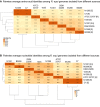Genomic analysis of a novel Rhodococcus (Prescottella) equi isolate from a bovine host
- PMID: 31302711
- PMCID: PMC6790187
- DOI: 10.1007/s00203-019-01695-z
Genomic analysis of a novel Rhodococcus (Prescottella) equi isolate from a bovine host
Abstract
Rhodococcus (Prescottella) equi causes pneumonia-like infections in foals with high mortality rates and can also infect a number of other animals. R. equi is also emerging as an opportunistic human pathogen. In this study, we have sequenced the genome of a novel R. equi isolate, B0269, isolated from the faeces of a bovine host. Comparative genomic analyses with seven other published R. equi genomes, including those from equine or human sources, revealed a pangenome comprising of 6876 genes with 4141 genes in the core genome. Two hundred and 75 genes were specific to the bovine isolate, mostly encoding hypothetical proteins of unknown function. However, these genes include four copies of terA and five copies of terD genes that may be involved in responding to chemical stress. Virulence characteristics in R. equi are associated with the presence of large plasmids carrying a pathogenicity island, including genes from the vap multigene family. A BLAST search of the protein sequences from known virulence-associated plasmids (pVAPA, pVAPB and pVAPN) revealed a similar plasmid backbone on two contigs in bovine isolate B0269; however, no homologues of the main virulence-associated genes, vapA, vapB or vapN, were identified. In summary, this study confirms that R. equi genomes are highly conserved and reports the presence of an apparently novel plasmid in the bovine isolate B0269 that needs further characterisation to understand its potential involvement in virulence properties.
Keywords: Bovine; Pathogenicity island; Plasmid; Pneumonia; Rhodococcus equi; Virulence.
Conflict of interest statement
The authors declare no competing interests.
Figures

Similar articles
-
Novel bovine-associated pVAPN plasmid type in Rhodococcus equi identified from lymph nodes of slaughtered cattle and lungs of people living with HIV/AIDS.Transbound Emerg Dis. 2018 Apr;65(2):321-326. doi: 10.1111/tbed.12785. Epub 2017 Dec 10. Transbound Emerg Dis. 2018. PMID: 29226632
-
Comparative Genomics of Rhodococcus equi Virulence Plasmids Indicates Host-Driven Evolution of the vap Pathogenicity Island.Genome Biol Evol. 2017 May 1;9(5):1241-1247. doi: 10.1093/gbe/evx057. Genome Biol Evol. 2017. PMID: 28369330 Free PMC article.
-
Reinvestigation of the virulence of Rhodococcus equi isolates from patients with and without AIDS.Lett Appl Microbiol. 2020 Dec;71(6):679-683. doi: 10.1111/lam.13386. Epub 2020 Oct 2. Lett Appl Microbiol. 2020. PMID: 32920889
-
Short review: Geographical distribution of equine-associated pVAPA plasmids in Rhodococcus equi in the world.Vet Microbiol. 2023 Dec;287:109919. doi: 10.1016/j.vetmic.2023.109919. Epub 2023 Nov 21. Vet Microbiol. 2023. PMID: 38000208 Review.
-
[Rhodococcus equi infections in humans: an emerging zoonotic pathogen].Nihon Saikingaku Zasshi. 2024;79(1):15-24. doi: 10.3412/jsb.79.15. Nihon Saikingaku Zasshi. 2024. PMID: 38382971 Review. Japanese.
Cited by
-
Responses to Ecopollutants and Pathogenization Risks of Saprotrophic Rhodococcus Species.Pathogens. 2021 Aug 2;10(8):974. doi: 10.3390/pathogens10080974. Pathogens. 2021. PMID: 34451438 Free PMC article. Review.
-
Complete genome sequence of a novel Prescottella sp. R16 isolate from deep-sea sediments in the western Pacific.Front Genet. 2024 Mar 14;15:1356956. doi: 10.3389/fgene.2024.1356956. eCollection 2024. Front Genet. 2024. PMID: 38549861 Free PMC article.
-
Rhodococcus strains as a good biotool for neutralizing pharmaceutical pollutants and obtaining therapeutically valuable products: Through the past into the future.Front Microbiol. 2022 Sep 29;13:967127. doi: 10.3389/fmicb.2022.967127. eCollection 2022. Front Microbiol. 2022. PMID: 36246215 Free PMC article. Review.
References
MeSH terms
Substances
LinkOut - more resources
Full Text Sources
Molecular Biology Databases
Research Materials

